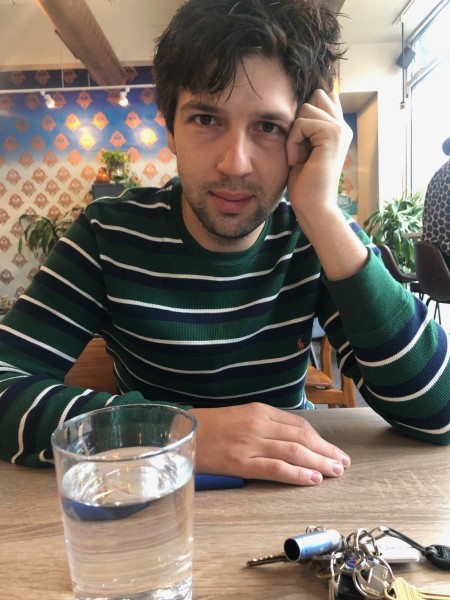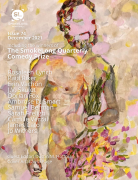The bond between Dani and the narrator is such an intimate and nuanced one. The text suggests they might even be twins: They were in the same second grade class; the heavy use of us, as in “It was then that everything changed for us”; and the intricate ending that brings to mind cryptophasia—the private language between twins, often characterized by a fast tempo and a staccato rhythm. Tell us more about this.
As a struggling writer and lowly warehouse manager, I’d like to maintain an air of mystery around myself … but you caught me. I have a twin sister in real life. She is nothing like the character in this story; she teaches math at an alternative high school. I just Facetimed her to ask if we have a secret language and she told me not to harass her while she’s grading papers and to shave my mustache, which I know means she loves me … so, yes, I will say we have some type of secret/private language.
I have to ask (because we’ve been debating this internally): Are Dani and the narrator the same person?
Literally? I’ll say: I think within the context of the story these two people are, in a way, meant to be two sides of the same coin. So, whether it’s some type of Fight Club situation or not … I would lean not. But I see how you’d get there. One is chaos. One is conscious. One is behaved and tethered, the other is broken, lost. I’ll go with both: They most definitely could be.
(Answer D. All of the above)
Tell us about the last five words of the story.
Three prong answer. Prong 1: Christian Winn (who runs the writing group I’m in and has taught me almost everything I know about short story writing) is a big fan of when a story ends in scene, so I sometimes force myself to try that type of ending first, and it’s normally better than whatever I’d planned on. Prong 2: I grew up writing music and still very much feel like I want people to have a chorus they can remember a piece by. I read a lot of stories and I feel like if a story has some lyrical thing the reader can attach the piece to it makes it stick out more. I hate to show the people whose homework I copied but think of “Bullet in the Brain” by Tobias Wolff, or the first few lines of “Blow-Up” by Cortázar, or half of all Saunders’ stories. Prong 3: I won’t dwell on this too long. My head is a gun. This narrator is finding their sibling in a bad way, a part of themselves in a bad way. I think anyone who knows or cares about someone with mental illness or addiction issues will understand, or at least accept that line as an okay interpretation as to what it’s like to be looking at someone you love but can’t help in the way they need it. To feel like the other shoe will drop again soon. To feel like the shoe will drop over and over for eternity, or until the shoe explodes. It makes you feel locked-and-loaded. It makes you feel sick: like maybe you’ll just be the shoe that explodes first.
There’s a lot of emphasis on memory and the potency of language. The story also explores the intrinsic meaning of words, their delivery, and how meanings shift. What drew you to these themes? What challenges did you face while writing this story?
There are character descriptors/scene descriptors in the story, certainly, but any real emotion or character work is done by describing how their voice sounds in any given situation. Dani, Ms. Looms, the narrator—all the big stuff in this piece is centered around what their voices are doing in these moments of conflict or love or pain. I think it goes to what I answered above, which is to say: In a short piece, I like to pick something the reader can hold onto (whether they are conscious of it or not) and by choosing to describe so much in this piece by what something sounds like, I can then sort of adjust the mood, the characters, the actions quickly by just describing that sound changing, or staying, or (like at the end) repeating. It’s a little bit of a trick: using the same sense, instead of all five senses, to do that character work. I’ve always just found that how you say something is more important than what you’re saying, or if you’re wearing a top hat while you’re saying it, or have green eyes while you’re saying it, et cetera. And to answer to the last part of your question, about challenges I faced while writing this story: It’s the same problem I always have when thinking about stories (especially very short pieces) while I’m at work—I CAN’T WAIT TO GET HOME AND GET IT DOWN ON PAPER. I work in a warehouse, so my job is physical but not too taxing on my brain, so if I’ve got a piece that I’m jacked up on, I’ll literally be writing in my head at work to the point where the second I get home I’ll have three paragraphs, almost word-for-word, ready to drop into a Word document. The downside: My hands get very dirty at work and it’s hard to take notes on the margins of the repair tickets. So, if I get too far ahead of myself (maybe over five hundred words), I will sometimes forget things, or lines, or good names I thought of. But in general, it’s good for my writing. I have this thing I must get done (work) to go home and do what I want (write, or read, or play Call of Duty with Wil).
What old memory have you carried with you from your boyhood days that continues to inform you as a person, as a writer?
Probably watching Rocky II at my grandparent’s house in Florida when I was six. My grandma had this replica mini-slot machine in the living room, and I was just sitting criss-cross watching Clubber Lang go off, playing on this little machine while my grandma watched the movie, gasping every time Mr. T hit Stallone in the face. He hits him in the face ten thousand times (no less) in that final fight. I think about that a good bit. Why did that afternoon feel so good? I think if I knew the answer it wouldn’t be a memory that stuck so deep. It probably has something to do with feeling fully content and not having anything to do but think about how funny her breathing was to me. It sounded like she was trying to suck up all the oxygen in Florida.



 The SmokeLong Grand Micro Contest (The Mikey) is now an annual competition celebrating and compensating the best micro fiction and nonfiction online.
The SmokeLong Grand Micro Contest (The Mikey) is now an annual competition celebrating and compensating the best micro fiction and nonfiction online.